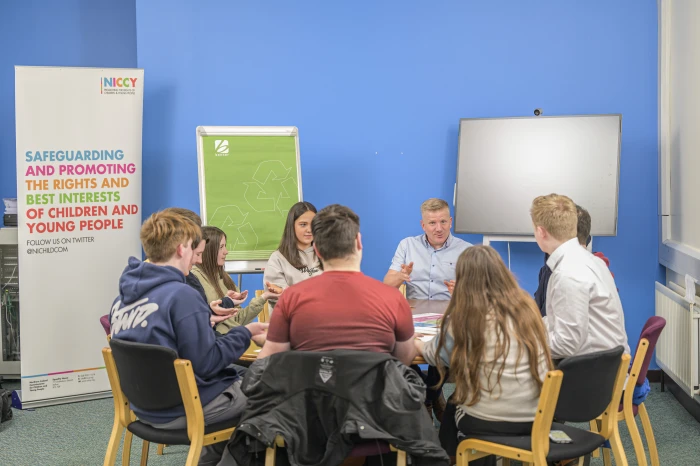

Today, 20 November, is World Children’s Day.
Observed every year, its purpose is to celebrate children, promote their rights, and advocate for their wellbeing. First established in 1954 as Universal Children’s Day, the date is deeply symbolic as it marks the adoption of the Declaration of the Rights of the Child in 1959, and the Convention on the Rights of the Child (UNCRC) in 1989, two landmark commitments by the United Nations to protect and empower children worldwide.
Since 1990, it has also served as a powerful reminder of the promises made to children and the ongoing work needed to ensure those rights are upheld in every corner of the world, including in Northern Ireland (NI).
Almost one quarter of our population is a child - under the age of 18 – each with their own hopes, challenges, needs and rights. Despite this, the extent and complexity of child rights violations that my office and I grapple with on a daily basis is alarming.
Having been appointed just over two years ago, I am more determined than ever to do all that I can, to make a positive impact on children’s lives, and in doing so, my values, beliefs and motivations remain the same as they did 30 years ago, when I started volunteering in the community in North Belfast.
That was a time of hope, and what we were about to see with the signing of the Good Friday Agreement in 1998, was a new beginning for children’s rights in NI. The establishment of my office in 2003, promises of a Bill of Rights, a new Children and Young People’s Strategy, a Minister for Children and a unit situated within the Office of the First and Deputy First Minister.
27 years since the Good Friday Agreement – we seem to have gone backwards! The statistics paint a stark picture.
In March this year, over 22,000 children were known to social services as a child in need, nearly 3,000 on the Child Protection Register and just over that in care. 45.2% of 16-year-olds met the criteria for probable mental illness, with girls disproportionately affected and health waiting lists continue to grow. We live in a society where one in four children are in poverty, paramilitaries and organised crime groups continue to exploit, coerce, groom and abuse, online harms are on the rise, and we have a crisis in special educational needs.
The impact of the COVID-19 pandemic continues. The recent Covid-19 Inquiry, of which I was a Core Participant of, heard how young people have spoken about the lack of reliable information, how they were scapegoated, and at times feared for their lives and the lives of their loved ones. Young people have highlighted to us how lonely and isolated they felt, and the impact this has had on mental health, education, and, indeed, their trust in government. The rights and best interests of children and young people, as we have seen and continue to do so, are not at the heart of government or decision making.
The way forward
So, what to do? How can we prioritise how to best safeguard, and promote the rights and best interests of children and young people? What can I and my office do to make a positive impact on children's lives – particularly those most vulnerable?
It is my belief that full and direct incorporation of the UNCRC into domestic law is the single-most important thing we can do – ensuring our government is fully accountable and does better for our children – in the long term.
Incorporating the UNCRC into domestic law is a key step towards realising children’s UNCRC rights and is a critical step to improving outcomes for all children and young people in NI. This would potentially provide new avenues for strategic litigation to support children’s rights, but the main impact has been in the mainstreaming of children’s rights into government policies and procedures, supporting proactive approaches to their implementation. Children most at risk including those in poverty, with disabilities, in care, or from minority backgrounds can benefit most from incorporation.
Scotland has become the latest jurisdiction to incorporate the UNCRC domestically, following many others around the world. Children and young people have and continue to be integral in this. They have called for incorporation, and they have asked us to ‘make the law stronger’. They have shared their lived experiences of how their rights have been violated, and how they have faced discrimination – they must be taken seriously, protected and be heard.
The theme for this year’s World Children’s Day is ‘My Day, My Rights’. It is an opportunity for children and young people to talk about their hopes, their rights and have their voices heard. At NICCY, we are hosting an event in Stormont, with elected representatives, decision and policy makers led entirely by our youth panel and attended by children and young people from all over NI. The Youth Panel, a panel of young people who help inform my work, are launching their own report on the state of children’s rights in NI and exploring the key issues they have experienced.
It’s important we all listen and then put into action the changes that we know will make a difference.
Find out more about our work on incorporation, as well as a copy of the NICCY Youth Panel’s report at: Incorporation of the UNCRC - Niccy
Chris Quinn is the Commissioner for Children and Young People in Northern Ireland and has been in office for just over two years.
The Commissioner for Children and Young People in NI has a statutory duty to safeguard and promote the rights and best interests of children, including reviewing the adequacy and effectiveness of laws and practices affecting them. Before taking up post in 2023, Chris held the role of Director of the Northern Ireland Youth Forum for 15 years and whilst as Children and Young People’s Coordinator at Belfast City Council, set up the first Youth Council. He lives with his wife and four sons, is a keen Manchester United Supporter and enjoys running.
Pivotal Platform is a home for guest writers to contribute their perspectives on public policy debates in Northern Ireland. The views expressed by guest writers are not necessarily those of Pivotal.





